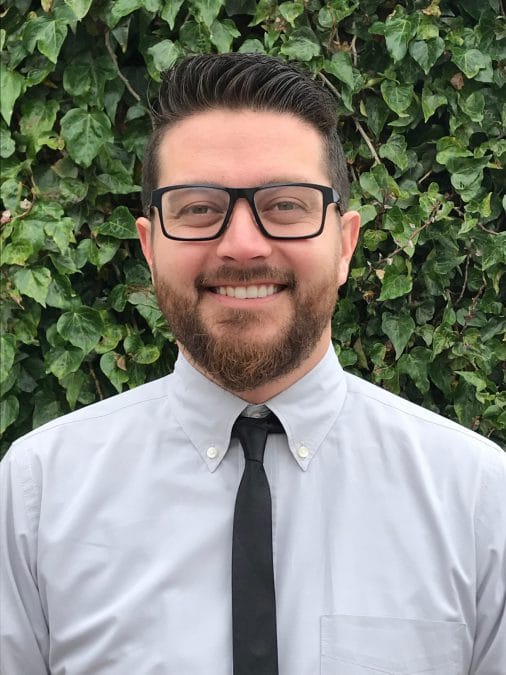Studying freshwater fish near the Pacific Coast of California seems somewhat counterintuitive, but Citizen Potawatomi Nation member Max Murray spent his time in graduate school at the University of California, Los Angeles snorkeling on his knees in the desert to find them.

“A lot of the places that we were snorkeling, you’re kind of just like doing pushups through a creek,” he said and laughed. “It probably looks bizarre if you are just someone walking by, just kind of sticking your face into what looks like little puddles and looking around.”
The DeLonais family descendant tried to fill knowledge gaps about freshwater fish for his dissertation. He graduated with a Master of Science in biology in the fall of 2019 with help of scholarships from the CPN Department of Education.
“It’s because of like the support that I got from the Tribe that I never had to take out a student loan for my entire academic career,” Murray said.
He now works full time for ECORP Consulting, Inc., an environmental consulting firm that contracts with private businesses, government departments and other organizations. Its staff complete topographical studies and biological assessments of land before development projects begin to reduce their impact and meet legal requirements.
Exciting parasites
Growing up in Southern California, Murray always spent time at the beach. He enjoys scuba diving, swimming and picnics on the sand. While at UCLA, he used that love of the outdoors to study freshwater fish and the parasites that coexist with them in an area of the country that supports little of their habitat.
“It’s kind of grotesque, but it’s something that not a lot of people, especially in the United States, are really interested in,” Murray said. “So it kind of has opened this open this pathway to maybe looking into more stuff like this in other states or across the U.S.”
His thesis discussed two types of fish brought together by the St. Francis Dam. Completed in 1926, it fed the Los Angeles Aqueduct, which redirected much needed water from the Owens River to one of California’s most populous and highly developed areas. The dam collapsed and caused major flooding in 1928, and historians labeled it an infrastructure catastrophe. Murray studied how the fish and their individual parasite systems now co-habitat as a result of human intervention.
“It’s always been really interesting to me that kind of interface between these animals, plants, whatever it may be, and they’re likely to be endangered or threatened, and development that kind of goes on in this region of California,” Murray said.
Murray logged many hours in the field finding and collecting fish as well as many more in the lab dissecting them and penning his observations. He said the out-of-pocket costs of research quickly multiplied. Without the scholarship from CPN, completing his thesis would have been difficult.
“I couldn’t be more grateful and appreciative for it, honestly,” he said.
He began working for ECORP after completing his bachelor’s in marine biology; after completing his master’s, the company hired him full time. Murray’s research comes in handy during his day-to-day duties.
“We’re kind of mostly focused in on things and rivers and streams in coastal California, and because there’s not a lot of water, the things that live there are kind of threatened. And a lot of them are endangered,” he said.
Considering academia
Murray spent three years working after completing his bachelor’s degree. Two professors attracted Murray to a graduate program; however, he questioned if he saw himself as an academic. After much convincing and support, he decided to return.
“It really kind of like changed my whole kind of my whole outlook on myself as an academic and kind of the things that I actually really like to do and the questions I like to ask,” Murray said. “So, yeah, it was a great opportunity. That’s kind of how the ball got rolling.”
Murray was the only Native American in his graduate program. Murray’s professor, Donald Booth, studied Native American culture while completing his master’s in anthropology, and knew some about Potawatomi history and culture.
“When he knew that I was getting this funding from the Tribe, he was like, ‘We need to make this really count,’” he said.
Murray continues to work on publishing his findings.
He said adjusting to a full-time job, especially in the midst of a pandemic, has been challenging. After growing accustomed to working on his feet while researching, completing office work through a computer feels lackadaisical. However, Murray occasionally travels for fieldwork by himself or in a small group, which gives him the same rush.
“When you find something that’s totally new and unknown, it’s almost like you’re exploring the deepest part of the ocean or something,” he said. “And this is something that’s really pretty much right in my backyard here. It’s really kind of cool to still know that there’s a lot of things that are unknown that are just right outside your door, really.”
Whether in the office, at home or in the field, “I love working with fish. I love working with amphibians. I think these things are really important. They don’t get nearly as much press, I guess, as fuzzy, other cute things,” Murray said.
Visit cpn.news/education for more information about scholarship opportunities with the CPN Department of Education.
